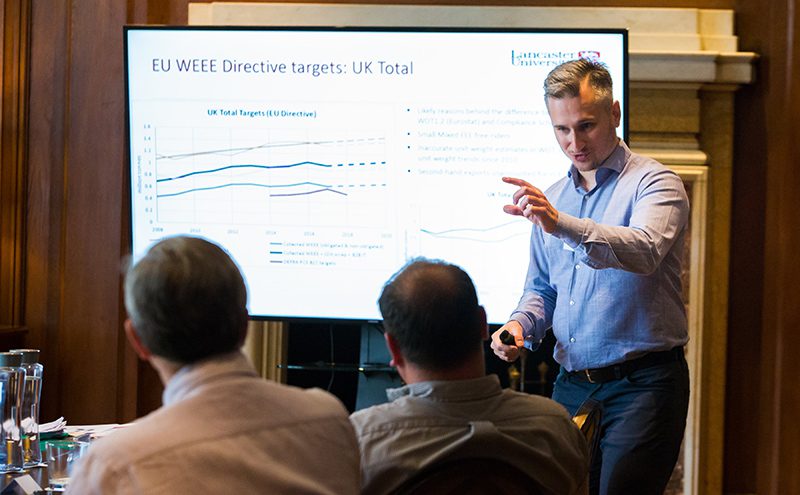
In early July, stakeholders from the UK’s EEE production and WEEE reuse and recycling sector convened for a roundtable debate to discuss the evidential basis for WEEE target setting and how better intelligence reflecting real-world trends can support future WEEE policy making.
The roundtable event took place on Tuesday 10 July in London, and included people involved in WEEE from government, waste management, compliance schemes, EEE producers, reuse and recycling organisations, retailers and academia.
In a complex environment, where there are likely to be frequent changes in the type of products being manufactured and purchased by consumers and businesses with its consequent impact on WEEE being collected, delegates discussed the issue of identifying reported and unreported WEEE flows and how to set accurate WEEE producer compliance targets reflecting socio-economic trends.
Attendees included Graeme Vickery and John Walsh from Defra, Susanne Baker from Tech UK, Andrew Mullen from Beko, Anthony Sant from AO, Cris Stephenson from Environcom, Nigel Harvey from Recolight, David Roman from British Heart Foundation, Dina Thain from Valpak, Alison Stowell and Dmitry Yumashev from Lancaster University Management School, and REPIC’s Mark Burrows Smith.
Quantification and the limits of existing models
During the one-day event, The Pentland Centre, Lancaster University shared findings from research commissioned by REPIC – the UK’s largest WEEE producer compliance scheme – revealing a new approach they are developing to quantify WEEE that will arise. The results, along with The Pentland Centre’s research, will be included in an upcoming white paper on improved target setting for WEEE to support the transition to a circular economy, due to be released in August.
Mark Burrows Smith, Chief Executive of REPIC said: “Current WEEE flow models and the data used to set collection targets have some limitations. The independent study REPIC commissioned the Pentland Centre, Lancaster University to undertake, has allowed us to better understand the econometric and other factors which affect how WEEE arises in the UK.
“The findings from the research project, along with the expertise and knowledge shared during the roundtable, has allowed us to re-evaluate and produce recommendations for the development of a dynamic WEEE flows model based on a wide range of economic and behavioural factors. Our hope is that the research project will provide the basis for an accurate and reliable model for WEEE forecasting that will better serve the move towards a circular economy.”
For more information visit www.repic.co.uk







